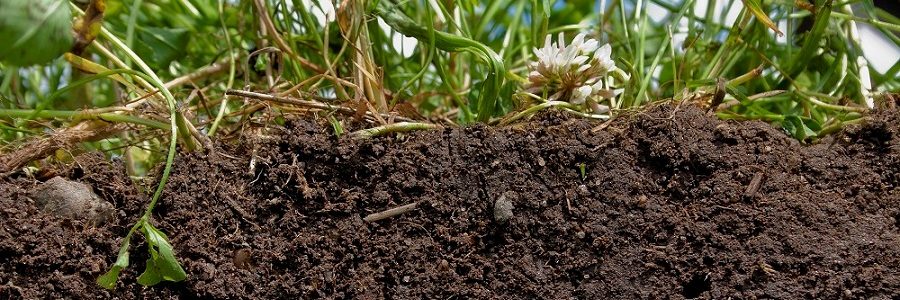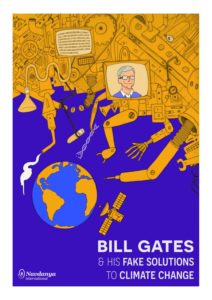
Climate change is one of the most pressing and damaging issues of our times and is expected to have increasingly disastrous effects on human populations and biodiversity, contributing to the global extinction of species and potentially, our society. We live in a time of unprecedented crisis generated by 200 years of planetary exploitation. This exploitation has led us down the path of possible, irreversible climate change, along with biodiversity erosion and extinction of species, which are at the root of the health and social crisis.
Is it governments, the private sector or consumers that should take action to tackle climate change? Stakeholders at all levels should be empowered to critically engage and tackle global challenges such as climate change, biodiversity loss and sustainable food security, for governments to understand the importance of ecological agriculture in climate change measures, and to lobby for government support for sustainable food systems in order to mitigate climate change.
Efforts to curb emissions are often geared towards the energy sector or halting deforestation. Yet the agriculture sector contributes between 24 – 33% (Gilbert, 2012; IPCC, 2014; FAO, 2014), and these trends are increasing, amounting to 5.4 Gt CO2e yr−1 in 2012 (Tubiello et al., 2015). In terms of climate action, there has been a polarization in the debate regarding allocation of responsibility between actors.
In order to achieve COP21 targets of limiting global warming to 2 °C above pre‐industrial level in 2100, agricultural emissions must be reduced to ~1 GtCO2e yr−1 by 2030, necessitating innovative mitigation options for carbon sequestration within agricultural systems (Wollenberg et al., 2016). Traditional agro-ecological production systems exhibit high adaptation and mitigation potential, offering key pathways to tackle the global challenge of climate change (Altieri & Nicholls, 2017). Through a transformative approach, agroecology can represent a true systemic solution, a cornerstone of the necessary paradigm shift, for building climate resilience by regenerating our planet, our biodiversity, our local communities, our health, and our democracy.
The climate crisis we are facing today is being exacerbated by the industrial food system which is both very vulnerable to climate change and a significant contributor to it. A global transition to biodiverse and local food and farming systems can be key both for mitigating and adapting to climate change and for ensuring food sovereignty.
But in the name of solving the climate crisis, large corporations, industries, and lobby groups are now promoting a whole range of ineffective, unproven, and sometimes dangerous false solutions through ‘innovative’ technologies. These techno-fixes cover a wide range of areas and can include genetically modified crops and gene editing, artificial and lab-grown foods, geoengineering, biofuels, climate-smart or precision agriculture, carbon credits, and so on. T
While these techno-fixes aren’t real solutions for the planet and human communities, we now have the choice to go down a different path, a path that acknowledges the central role food systems have in building climate resilience.
In 2008, before the climate summit in Copenhagen, Dr Vandana Shiva wrote the book Soil Not Oil. It was a time when the intimate connections between climate and agriculture, air and soil were not being recognized in any forum, neither in the negotiations on climate change nor in the climate movement. Since then we have witnessed the attempt by agri-corporations to hijack climate talks by blocking the ratification of binding agreements for governments.
We are witnessing today the attempt by agri-corporations, in conjunction with the WEF, to hijack the narrative of transition, by manipulating the vocabulary, and propose either greenwashed or techno “silver bullet” solutions. In this way, emitters and polluters can continue with business as usual, hidden behind well orchestrated propaganda campaigns, whereby the perpetrators of the industrialized, globalized -and now digitized – predatory economic model that has led to worldwide ecological devastation, are trying to sell us their solutions as the only path forward.
The climate crises must be framed in a much more holistic way in terms of food systems that are ecologically sustainable and regenerative, like agroecology, which both builds soil health and sequesters carbon. The goal cannot be only sequestering carbon, but the overall health of ecosystems and people, the generation of livelihoods and healthy economies, the creation of equity and justice.
Over the last decade, Navdanya International has played a key role in the international Regenerative Agricuture movement in clearly defining the central role of food systems in the issues of climate change and climate justice. The debate on the climate change issue cannot avoid considering how the dominant technological and economic model, based on fossil fuels, does not take into account the finitude of the Earth’s resources and is blind to the living processes that create living soil, as well as to the fact that the fate of societies and civilizations is intimately connected to how we treat the soil and how we grow and distribute the food we eat.
Navdanya International’s work on climate change, including the Manifesto ‘Terra Viva’ Our Soils, Our Commons, Our Future – a new vision for planetary citizenship’ and the mobilization at COP21 in Paris with the Pact for the Earth in December 2015, has shown the impact of industrial agriculture, as major contributor to greenhouse gases emission, but also how the solution for building resilience for small farmers as well as adaptation and mitigation to climate change and social justice comes from local ecological agriculture and food systems, local circular economies, local seeds and care for the soil which has the ability of taking back carbon dioxide in the ground.
Navdanya International’s workshops on Climate Change also offer a detailed analysis on the false solutions promoted by the industry, such as Climate Smart Agriculture and Geoengineering, which are means of corporate power to perpetrate the same extractive model and find new ways to grab resources.
Navdanya’s publication “Seeds Of Hope, Seeds Of Resilience – How Biodiversity and Agroecology offer Solutions to Climate Change”, describes experiences on the ground with communities across India, which conserve Biodiversity and practice Agroecology based on Biodiversity intensification. Diversity of living systems are an expression of their capacity to evolve and adapt. Agro-biodiversity in natural ecosystems has been adapting naturally or autonomously to changing conditions. As the magnitude of climate change increases with time, the need for co-evolution for adaptation through agrobiodiversity conservation and evolutionary breeding becomes more acute. The report shows that not only can we address climate change and rejuvenate the planet, one seed at a time, but also that, in so doing we produce more and better food which could provide enough nourishment for two times the world population.
In 2019 Navdanya International launched an on-line educational project on Climate change in collaboration with A Sud – Italy, Door – Croatia, Za Zemiata – Bulgaria and other 3 EU organisations. The ClimAlt Course is co-financed by the EU within the Framework of the Erasmus+ Project. The project aims to raise youth awareness on solutions to climate change through exploring, discussing, analysing and spreading local and concrete examples of climate friendly activities, thus reinforcing the perception that changes are possible and that youth can generate them. The course included the Webinar Food, Health, and Climate: Interconnected Crises, denouncing false solutionism in favor of sustainable solutions, with Dr Vandana Shiva and Nnimmo Bassey.
In April 2021, Navdanya International published a briefing paper on Bill Gates & His Fake Solutions to Climate Change, which details the reasons behind Bill Gates’ attempts to focus the debate on miraculous technologies and the real interests behind the propaganda.  This paper exposes how Gates’ million-dollar grants into various sectors work to align public opinion and the media, international and state policy, and private companies to open up new markets for private companies. Ensuring the further concentration of failed industrial models. Through examples such as one of Gates’ most prominent investments funds, Breakthrough Energy Ventures, or his push for plant-based fake food, this brief shows how this notion of technological acceleration as the only solution to the world’s problems results in the same people, giant corporations and power structures that created our current crises to sell back to us their own proposed ‘solution’. In the end, diverting attention away from the deep systemic changes that are needed to address the crises we are facing today. Instead, we have the opportunity to truly foster an ecological approach to food and agriculture, taking into deep account the web of biodiversity, food sovereignty, and local food communities, to help protect Earth and human health.
This paper exposes how Gates’ million-dollar grants into various sectors work to align public opinion and the media, international and state policy, and private companies to open up new markets for private companies. Ensuring the further concentration of failed industrial models. Through examples such as one of Gates’ most prominent investments funds, Breakthrough Energy Ventures, or his push for plant-based fake food, this brief shows how this notion of technological acceleration as the only solution to the world’s problems results in the same people, giant corporations and power structures that created our current crises to sell back to us their own proposed ‘solution’. In the end, diverting attention away from the deep systemic changes that are needed to address the crises we are facing today. Instead, we have the opportunity to truly foster an ecological approach to food and agriculture, taking into deep account the web of biodiversity, food sovereignty, and local food communities, to help protect Earth and human health.
On 23 June 2021, Navdanya International hosted an online event – Which Future for our Climate? Technofixes vs Biodiversity-based solutions. This workshop and discussion was organised as part of the European project ClimAlt, During the event, we were joined by Dr. Vandana Shiva, President of Navdanya International, and Nicoletta Dentico, journalist, and Director of the Health Justice Programme of the Society for International Development (SID), who discussed real and false solutions to climate change.
Also watch
–
–
